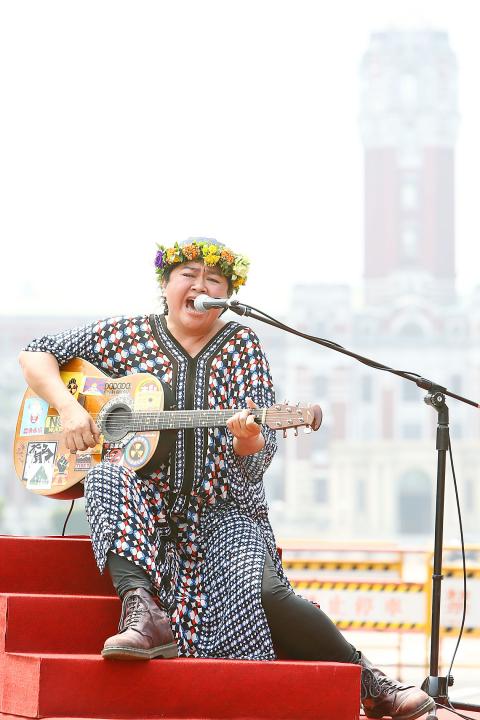Aboriginal rights campaigner Panai Kusui and other advocates yesterday relocated dozens of potted lilies from their protest site at the 228 Peace Memorial Park to an art museum as the Taipei City Government prepares to demolish their camp next week.
After the government announced the Guidelines for Demarcating Aboriginal Land or Tribal Areas (原住民族土地或部落範圍土地劃設辦法) in February 2017, Panai and other advocates camped on Ketagalan Boulevard, in front of the Presidential Office Building, in protest and were later forced to move to the nearby park.
The guidelines restrict Aboriginal domains to government-owned plots and exclude areas owned by private landowners, enabling businesses to launch controversial development projects on Aboriginal land, such as the Miramar Resort Hotel (美麗灣渡假村) project, advocate Liao Hsing-yu (廖幸渝) said yesterday.

Photo: Chen Yi-kuan, Taipei Times
Under the slogan “No one is an outsider,” the campaigners yesterday had camped in the area for 696 days, Liao said.
However, the municipality has said that it would remove their belongings on Tuesday, she said.
The government might have timed the removal to take advantage of the absence of other key campaigners, such as filmmaker Mayaw Biho and singer Nabu Husungan Istanda, who have left for other events, she added.
RELOCATION
The activists yesterday invited members of the public to help them relocate some of the nearly 300 pots of Taiwanese indigenous lily sprouts to the Taipei Fine Arts Museum, where they have an exhibition area at the Taipei Biennial, which this year is titled Post-Nature — A Museum as an Ecosystem and ends on March 10.
Lilies are a sacred symbol for the Rukai people and campaigners from different Aboriginal communities have expressed the hope that they could return home by the time the plants blossom.
VITALITY
Taiwanese indigenous lilies are full of vitality and people who care for them should not rush to weed their pots, Panai said, before transporting some of the lilies by MRT along with nearly 20 participants.
The Democratic Progressive Party government has defended Taiwanese dignity in the face of Chinese pressure, yet it is insensitive toward the pain of Aborigines, who were deprived of their ancestral lands, languages and cultures, she said in a previous TV interview.
She added that she would continue to fight for Aborigines’ rights and raise public awareness about their predicament.

A preclearance service to facilitate entry for people traveling to select airports in Japan would be available from Thursday next week to Feb. 25 at Taiwan Taoyuan International Airport, Taoyuan International Airport Corp (TIAC) said on Tuesday. The service was first made available to Taiwanese travelers throughout the winter vacation of 2024 and during the Lunar New Year holiday. In addition to flights to the Japanese cities of Hakodate, Asahikawa, Akita, Sendai, Niigata, Okayama, Takamatsu, Kumamoto and Kagoshima, the service would be available to travelers to Kobe and Oita. The service can be accessed by passengers of 15 flight routes operated by

Chinese spouse and influencer Guan Guan’s (關關) residency permit has been revoked for repeatedly posting pro-China videos that threaten national security, the National Immigration Agency confirmed today. Guan Guan has said many controversial statements in her videos posted to Douyin (抖音), including “the red flag will soon be painted all over Taiwan” and “Taiwan is an inseparable part of China,” and expressing hope for expedited reunification. The agency last year received multiple reports alleging that Guan Guan had advocated for armed reunification. After verifying the reports, the agency last month issued a notice requiring her to appear and explain her actions. Guan

GIVE AND TAKE: Blood demand continues to rise each year, while fewer young donors are available due to the nation’s falling birthrate, a doctor said Blood donors can redeem points earned from donations to obtain limited edition Formosan black bear travel mugs, the Kaohsiung Blood Center said yesterday, as it announced a goal of stocking 20,000 units of blood prior to the Lunar New Year. The last month of the lunar year is National Blood Donation Month, when local centers seek to stockpile blood for use during the Lunar New Year holiday. The blood demand in southern Taiwan — including Tainan and Kaohsiung, as well as Chiayi, Pingtung, Penghu and Taitung counties — is about 2,000 units per day, the center said. The donation campaign aims to boost

The Central Weather Administration (CWA) said a magnitude 4.9 earthquake that struck off the coast of eastern Taiwan yesterday was an independent event and part of a stress-adjustment process. The earthquake occurred at 4:47pm, with its epicenter at sea about 45.4km south of Yilan County Hall at a depth of 5.9km, the CWA said. The quake's intensity, which gauges the actual effects of a temblor, was highest in several townships in Yilan and neighboring Hualien County, where it measured 4 on Taiwan's seven-tier intensity scale, the CWA said. Lin Po-yu (林柏佑), a division chief at the CWA's Seismological Center, told a news conference